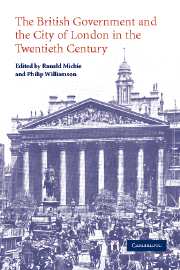Book contents
- Frontmatter
- Contents
- Notes on contributors
- Acknowledgements
- Conventions and abbreviations
- Introduction
- Part I The long perspective
- 1 The City of London and government in modern Britain: debates and politics
- 2 The City of London and the British government: the changing relationship
- Part II Markets and society
- Part III Government and political parties
- Part IV The interwar period
- Part V 1945–2000
- Select bibliography
- Index
1 - The City of London and government in modern Britain: debates and politics
Published online by Cambridge University Press: 04 July 2009
- Frontmatter
- Contents
- Notes on contributors
- Acknowledgements
- Conventions and abbreviations
- Introduction
- Part I The long perspective
- 1 The City of London and government in modern Britain: debates and politics
- 2 The City of London and the British government: the changing relationship
- Part II Markets and society
- Part III Government and political parties
- Part IV The interwar period
- Part V 1945–2000
- Select bibliography
- Index
Summary
Substantial historical interest in the City of London is a recent development. Financial historians studied its main institutions, some of its leading banks and aspects of monetary policy, but it received little comment even from other economic historians and was usually ignored in more general histories. Only in the 1980s did ‘the City’, considered as a whole, become a unit of study and enter the mainstream of historical attention, and only then did it attract interest from political scientists and sociologists. Partly this reflected the contemporary prominence of the City, due to the transformations which were then taking place in the financial system and the publicity given to the fabulous incomes and conspicuous consumption of financial dealers. A larger reason was a shift in the long-running debate about the relative decline of the British economy, meaning primarily manufacturing industry. After numerous other possible ‘causes’ had been investigated, the financial sector now seemed to be the chief culprit. At first attention focused on the supposed failure of the banks and the Stock Exchange to supply industry with adequate amounts or appropriate forms of capital. Increasingly, however, the damage inflicted by the City seemed more wide-ranging: except during the two world wars, it had exercised the dominant influence over government economic policy. Such claims connected with work by historians in other fields, and gave the City, and indeed financial history, an entirely new salience.
- Type
- Chapter
- Information
- Publisher: Cambridge University PressPrint publication year: 2004
- 4
- Cited by

